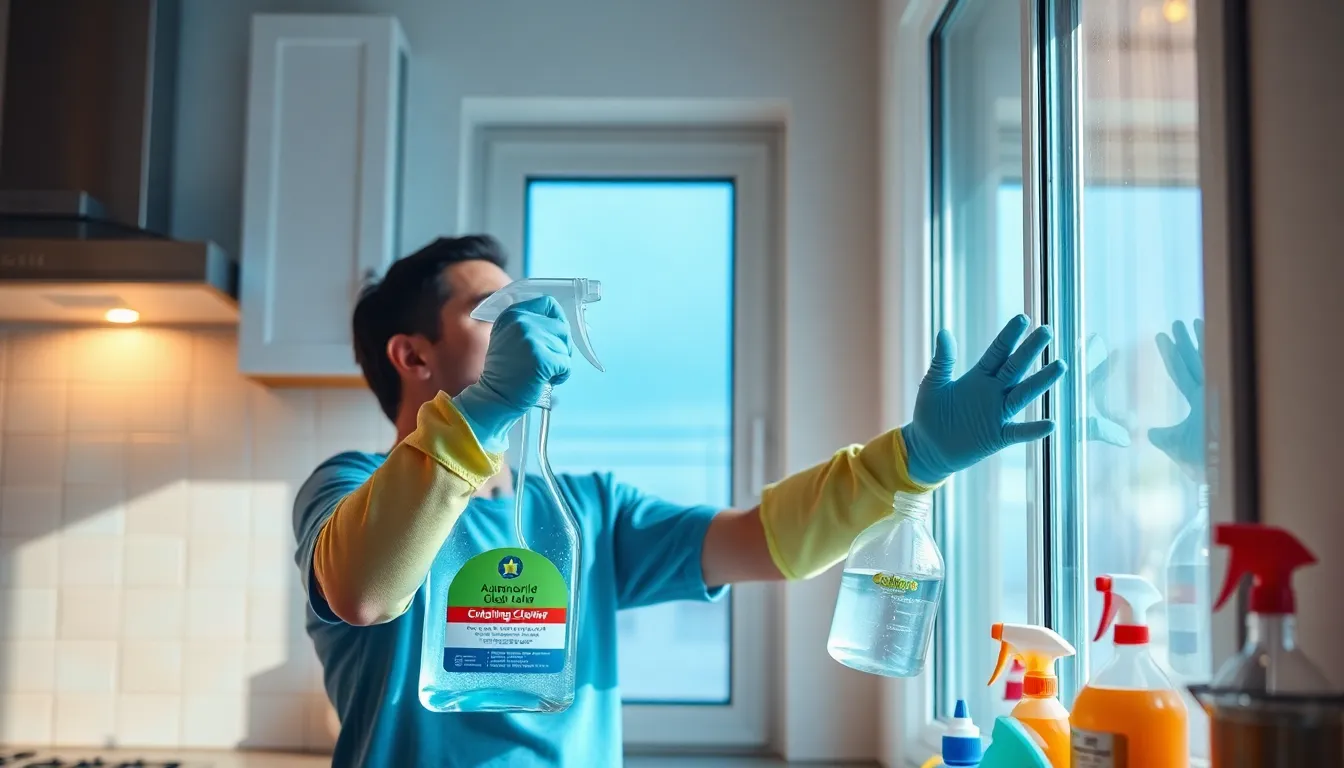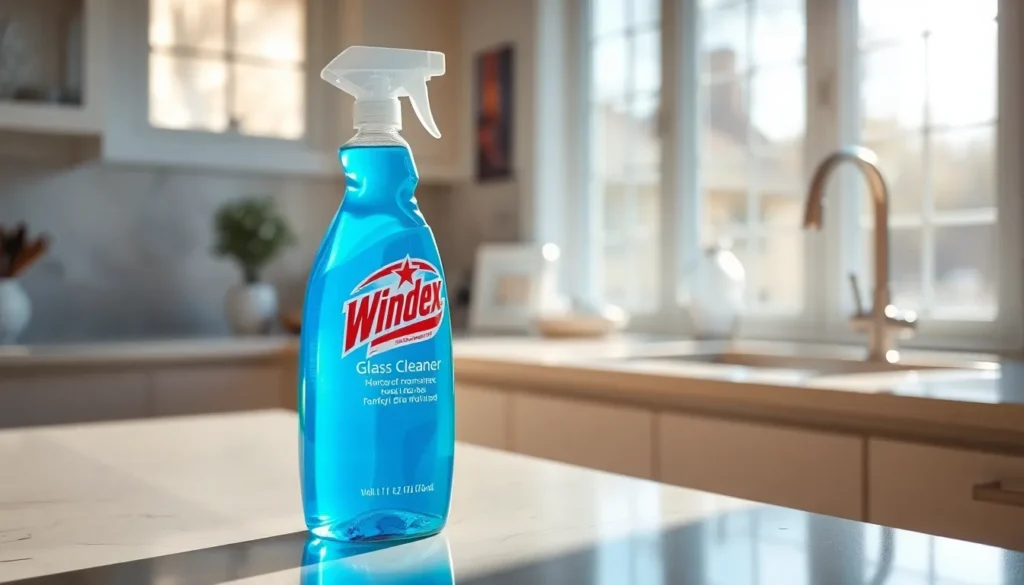Table of Contents
ToggleWhen it comes to cleaning, ammonia is like the superhero of the household – powerful, effective, and sometimes a little misunderstood. Many people don’t realize just how common this cleaning marvel is. From tackling tough stains to banishing odors, ammonia packs a punch that can leave surfaces sparkling. But wait! Before diving headfirst into a cleaning frenzy, it’s crucial to know which products contain this mighty ingredient.
What Cleaning Products Have Ammonia?
Numerous cleaning products contain ammonia, making them popular choices for both households and professional settings. Glass cleaners often use ammonia due to its effectiveness in providing streak-free shine. Tile and grout cleaners also frequently contain ammonia, enabling deep cleaning of tough stains.
Bathroom cleaners typically incorporate ammonia to combat soap scum and hard water deposits. Some all-purpose cleaners utilize ammonia for its grease-fighting capabilities. Floor cleaners may include ammonia as well, especially those formulated for tile or laminate surfaces.
Certain brands specifically market ammonia-based cleaning products, which are easily identifiable by their ingredient labels. Examples of these brands include Windex for glass cleaning and Zep for industrial cleaning solutions. Label reading remains essential; consumers must verify ammonia content for safe use.
Additionally, laundry detergents that target tough stains sometimes have ammonia as an ingredient. Products designed for disinfecting surfaces may also include ammonia alongside other active ingredients. Understanding these categories helps users make informed choices about cleaning options.
Common Household Cleaning Products

Many common household cleaning products contain ammonia, which enhances their effectiveness. Recognizing these products helps consumers make informed choices.
Glass Cleaners
Glass cleaners often include ammonia due to its ability to create a streak-free shine. These products effectively cut through grime, dust, and fingerprints on glass surfaces. Brands like Windex prominently feature ammonia in their formulations, ensuring clear and spotless windows. The rapid evaporation rate of ammonia aids quick drying, minimizing the likelihood of streaks. Users should always check labels to confirm ammonia content, as some glass cleaners may offer ammonia-free alternatives.
All-Purpose Cleaners
All-purpose cleaners frequently utilize ammonia for its powerful grease-cutting properties. These products effectively tackle dirt and stains on multiple surfaces, making them versatile for cleaning tasks. Brands such as Zep include ammonia in their all-purpose formulations, adding to their cleaning strength. It’s essential to evaluate labels since not all all-purpose cleaners contain ammonia. Those with asthma or sensitivities must take care, as ammonia can cause irritation in some individuals.
Industrial Cleaning Products
Ammonia appears in various industrial cleaning products due to its effectiveness in eliminating tough stains and odors. Understanding which specific products contain ammonia enhances cleaning efficiency.
Heavy-Duty Degreasers
Heavy-duty degreasers often rely on ammonia for breaking down grease and grime. Industrial kitchens and manufacturing facilities frequently benefit from ammonia-based degreasers, as they can dissolve heavy deposits with ease. Brands like Zep and Krud Kutter offer formulations that incorporate ammonia, allowing for rapid cleaning of equipment and surfaces. Users should follow safety instructions carefully, as concentrated ammonia can be hazardous in poorly ventilated areas.
Floor Strippers
Floor strippers commonly utilize ammonia to remove old finishes and dirt from hard surfaces. These products work effectively on a variety of flooring materials, including vinyl, tile, and hardwood. The ammonia content aids in penetrating tough layers of wax and grime. Popular brands like Armstrong and Diversey provide ammonia-based options that speed up the stripping process. Proper application techniques ensure even coverage and optimal results, while protective gear should be worn to avoid irritation.
Health and Safety Considerations
Understanding the health and safety aspects of ammonia in cleaning products is crucial. Ammonia can irritate the skin, eyes, and respiratory system, especially in concentrated forms. Users should ensure proper ventilation while cleaning. Mixing ammonia with bleach creates toxic chloramine vapors, posing serious health risks. Protective gloves and masks help minimize exposure during usage.
Proper Usage Guidelines
Applying ammonia-based cleaners requires precaution. Always read labels carefully for instructions and safety warnings. It’s advisable to test cleaners on small, inconspicuous areas to ensure no damage occurs. Using a well-ventilated space improves air quality. Storing ammonia products out of reach of children and pets prevents accidental exposure. Following these guidelines enhances safety while maintaining cleaning effectiveness.
Alternatives to Ammonia-Based Cleaners
Several effective alternatives to ammonia-based cleaners exist. Vinegar offers a natural solution for cutting through grease and removing stains. Baking soda serves as a gentle abrasive, ideal for scrubbing surfaces without scratching. Castile soap provides a biodegradable option for various cleaning tasks. Citric acid works well for tackling soap scum and mineral deposits. These alternatives not only ensure a safer cleaning experience but also cater to eco-conscious consumers.
Understanding which cleaning products contain ammonia is essential for effective and safe cleaning. Ammonia’s powerful stain-fighting and odor-eliminating properties make it a popular choice in many household and industrial cleaners. Users should always check labels to ensure they’re aware of the ammonia content in their products.
While ammonia can provide excellent results, it’s crucial to follow safety guidelines to prevent irritation and accidents. For those seeking safer alternatives, options like vinegar and baking soda offer effective cleaning without the risks associated with ammonia. By making informed choices, individuals can maintain a clean home while prioritizing health and safety.




